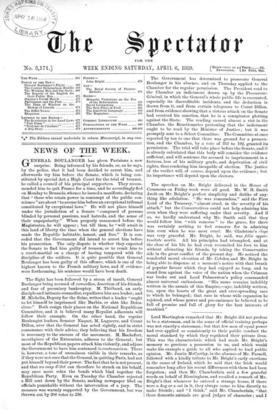The speeches on Mr. Bright delivered in the House of
Commons on Friday week were all good. Mr. W. H. Smith dwelt on Mr. Bright's perfect simplicity and dislike of any- thing like adulation. " He was remorseless," said the First Lord of the Treasury, " almost cruel, in the severity of his attack," but the Conservatives could not help admiring him even when they were suffering under that severity. And if so, we hardly understand why Mr. Smith said that they would follow him " with remorse " to the grave, for there was certainly nothing to feel remorse for in admiring him even when he was most cruel. Mr. Gladstone's doge was very graceful. Mr. Bright, he said, was felix oppor- tunitate mortis. All his principles had triumphed, and at the close of his life he had even reconciled his foes to him without alienating his friends, by taking the Conservative side in the great conflict of the present day. He noticed the wonderful moral elevation of Mr. Cobden and Mr. Bright in being able to dispense at a moment's notice with that breath of popular favour which they had enjoyed so long, and to stand firm against the voice of the nation when the Crimean war broke out and Lord Palmerston's policy commanded almost universal enthusiasm. "His name remains indelibly written in the annals of this Empire,—aye, indelibly written, too, upon the hearts of the great and ever-spreading race to which he belonged ; that race in whose wide expansion he rejoiced, and whose power and pre-eminence he believed to be full of promise and full of glory for the beet interests of mankind."


































